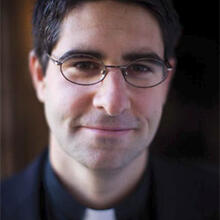Recently, Randy Boyagoda, a professor of English and a writer of fiction and essays, offered a provocative call to reflective Christians to put down their Flannery O’Connor and Dostoyevsky and pick up some hard cover fiction in order to revive the Christian literary imagination and Catholic literature. While I do not agree with his criticism of Mr. Paul Elie, who is—I think—presently working quite hard to accomplish the things that Prof. Boyagoda urges him to begin, Prof. Boyagoda’s impatience with the dependence of Catholic readers and writers of fiction on the greatest hits of Christian writers is well founded. And so, over the next few months, I hope to select works of fiction that do not have a clear religious character for the Catholic Book Club.
For October, I have selected Enon, a novel by Paul Harding. Harding wrote Tinkers, which won the Pulitzer prize in 2010. Harding’s writing resembles that of Marilynne Robinson. The prose of Tinkers is subtle and careful and bare and haunting. Harding’s description of a grand mal seizure as a wild electrical storm in the brain of one of the main characters remains vivid in my mind four years after reading it. Like Tinkers, Enon is stark and beautiful like a harsh New England winter.
When I read Harding, I keep thinking of Gerard Manley Hopkins’ poem “God’s Grandeur.” Indeed, this poem is on the list of greatest hits from which Prof. Boyagoda urges us to turn our attention. Yet Hopkins’ poem helps me to understand the expanse of wet and bone and thicket and swamp that Harding depicts in the New England landscape of his two novels. Hopkins writes:
For Harding, there is a power of life that emanates from the liquors of rot and decay that form in pools of sodden leaves manifest in the melt of late March. There is some force of hope or human kindness or trace of joy that weathers the most violent storms of grief. There is a stubborn freshness deep down in the soil that drives the continuation of life, and, when one is brought low or made quiet in some way, a person can sense it vividly.
Enon is a fictional town somewhere on the north shore of Massachusetts. Its name stems in part from the first sermon preached there in 1642 in a meadow. The preacher spoke about John 3:23 and John the Baptist’s work baptizing the multitudes. In the gospel, John baptized at Enon because there was much water there. There is much water in Enon, Massachusetts as well. There are lakes, creeks, ponds and swamps. It is around the bend of Enon Lake that Kate Crosby—the 13 year-old daughter of the narrator of the novel—is killed while riding her bike. Toward the end of the novel, there is also a baptism of sort—a purgative self-plunging that takes place after a prophet like figure confronts the narrator’s over indulgence in grief and wild despair. The prose moved me close to tears, and I am not a sentimental type. I offer just a snippet of this self-plunging scene. The narrator and father of Kate thinks the following to himself while underwater:
…But that was only how I’d felt since Kate died. I felt as if it was always true and that I was merely deluded before, that I believed in, was enchanted by, a lie of love and goodness, simply because I had it so good for a time. But it was not a lie while I lived it. It was true. It was as true as my despair after her death. I would never have called myself an optimist, or even happy in the sense of being satisfied. I was always restless and ill at ease, running too hot. But Kate gave my life joy. I loved her totally, and while I loved her, the world was love. Once she was gone, the world seemed to prove nothing more than ruins and the smoldering dreams of monsters (217).
A few days ago, The New York Times offered a perfunctory review of Enon that claimed the novel to be plotless. This is not the case. Perhaps, this is exactly where the reflective—even religious—reader may serve to break open the riches of such subtle, bare prose. And so, I ask that the Catholic Book Club consider Enon this month. Consider its presentation of a world bursting with some power that throbs with fecundity even amidst death. Consider its presentation of grief, despair, addiction and transformation. Consider what triggers the transformation and how this transformation might be incomplete. Above all, consider how God is either present or hauntingly absent in the narrative. This is not an overtly religious novel. In fact, it seems stripped of faith. But, please apply your Catholic, religious imagination to its interpretation and consider the following questions:
1. Is Charlie Crosby a good man? Is he a man of extraordinary depth?
2. Can you identify with the level of grief that the narrator attempts to convey through the novel?
3. Is the agent of Charlie’s transformation hope? Is it somehow a Christian hope?
I would appreciate any comments you wish to contribute.









Someone by Alice McDermott. Thanks for asking!